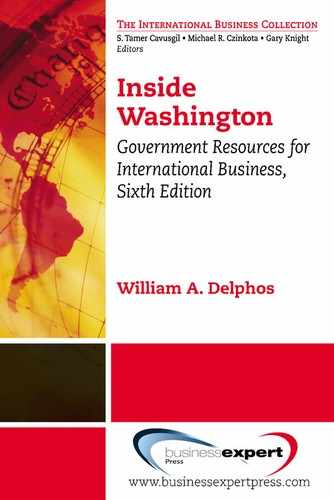Imagine walking into the neighborhood grocery store to buy a jar of chunky peanut butter. As you enter the store, you are stunned to discover that the aisles have been rearranged. Instead of familiar product groups, the displays are organized by manufacturer—Procter & Gamble, General Foods, Del Monte, Kraft, and so forth. What should have been a simple shopping excursion has now become a bizarre hunting expedition, where success rests on a combination of dogged determination and hours spent watching CNBC. Who manufactures peanut butter? Which company makes chunky peanut butter? And who makes chunky peanut butter in a recyclable plastic tub?
Several U.S. government agencies, development finance institutions, and Washington, DC–based offices of foreign government agencies provide services for U.S. businesses seeking to enter the international marketplace. The purpose of this book is to make information about U.S. government assistance and resources more accessible to the international business community. It is designed to unscramble the scores of government programs available for American and international firms seeking to do business globally—taking them off the shelves now marked U.S. Department of Commerce (DOC), Export-Import Bank of the United States (Ex-Im Bank), United States Small Business Administration (SBA), Overseas Private Investment Corporation (OPIC), International Finance Corporation (IFC), and putting them onto more logical shelves such as financing, regulations, and market information.
When I first arrived in Washington in 1981 to take an appointment at OPIC, I was amazed at the range and scope of government resources available to help companies expand overseas. I realized that I could have used many of the programs in my previous position as managing director of international operations at a large multinational corporation. My research and experience confirmed that the vast majority of business executives were also unaware of these “well-kept secrets.”
Since that time, Washington’s approach to supporting the overseas expansion of U.S. companies has changed significantly. Government agencies work more closely with each other to assist the business community. Ex-Im Bank, OPIC, and the U.S. Trade and Development Agency (USTDA) now take a much more proactive approach. The Department of Commerce and Department of State now advocate U.S. business positions abroad, and U.S. agencies are more sensitive to overseas competition and are more willing to neutralize the effects of subsidized financing from our competitors. Recognizing the shortage of investment capital in the developing world (or “emerging markets” in today’s parlance), the U.S. government has taken the lead to support a number of private equity funds, which can shore up good overseas projects where existing lending programs and private capital are insufficient. Export assistance has become much more accessible to businesses looking to broaden their operations
While U.S. government agencies have “reinvented” themselves, development finance institutions such as the World Bank have recognized the critical role of private industry in emerging markets and have adjusted their lending programs accordingly. Development banks now actively work with OECD-based and local private businesses to spur growth and technology transfer to developing countries. On the public sector side, technical assistance, training, and improved procurement procedures make projects funded by these organizations multibillion-dollar opportunities few companies can afford to pass up.
While it would be an exaggeration to suggest that this publication is all-inclusive, every effort has been made to include detailed descriptions of the major government programs available for U.S. businesses considering overseas operations. It is our hope that this book will make a significant contribution to strengthening the working partnership between the private sector and the government—a partnership that is critical for U.S. competitiveness and growth and for reducing poverty in the developing world.
William A. Delphos
January 2012
Washington, DC
